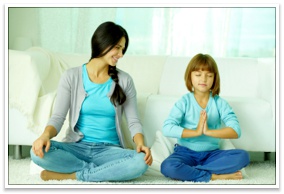For Lovers of Meditation
Teaching Meditation To Children
Should we be teaching meditation to children? Christopher Lloyd Clarke shares his views in this article and invites you to join the discussion on the pros and cons of meditation for children by adding your comments below.
Catherine and Claire's Story
Catherine is a close friend of mine who teaches meditation and other personal development modalities. She has a granddaughter called Claire to whom she began teaching basic meditation and visualization techniques from the age of four (four-and-a-half if you ask Claire – that extra half is a big deal you know!).
I will never forget the look of pride and joy on Catherine’s face when she told me how Claire has learned to let go of negative emotions…
“I can’t recall why, but Claire was very upset and she was on a mission to make sure that everyone around her knew about it. She was being very loud and I could tell that she was gearing up for a full scale tantrum. This was a perfect opportunity for me to see if she would be able to remember what I had been teaching her about meditating on her heart, so I caught her attention and asked, “Claire darling, how does your heart feel right now?” Her frown deepened momentarily. She was still caught up in her anger, but she had just enough presence of mind to recognize that she did not like the way her heart was feeling in that moment. Without any further prompting she turned away from me, took a seat in her beanbag and closed her eyes. Less than two minutes later she returned to my side and with a broad smile declared, “I have a happy heart again grandma”.
What an incredible gift Claire has. With very little prompting she was able to demonstrate a high level of self-awareness, she took responsibility for her emotional state and in a short period of time was able to restore herself to a much happier and peaceful frame of mind.
Grandma’s feelings of pride and joy are well deserved, and this story also conjures up one other feeling in me. Hope. Hope for a more peaceful future and a better world for our children to grow up in.
Let’s face it; our world can be a difficult place for children to adapt to. Young people today are subjected to more pressure than ever before, especially schooling and social pressures. I can’t help wondering if all this pressure is partly responsible for the dramatic increase in attention deficit hyperactivity disorder (ADHD) amongst children.
In the USA the number of prescriptions to treat ADHD have increased by 46% in the last 10 years. In Australia, the number has more than doubled in that time. This is just one of many indicators that our children are experiencing a world that is becoming more stressful, more hurried, more complex and more competitive. Now more than ever, teaching children how to relax and enjoy the pleasure of a quiet, happy mind is so important. Meditation is a natural way to manage stress and it’s a skill that every child (and adult) would do well to develop.
Now I should point out that when I talk about teaching meditation to children, I’m not suggesting that we shave their heads, dress them in saffron robes and send them off to a monastery in the middle of no-where (though that is the normal practice in some cultures who prize meditation very highly). Meditation for children should not be a rigid, formal practice, but rather a form of quiet gameplay that incorporates simple relaxation exercises and positive visualizations. Kids respond best to meditation when it’s:
a. Fun as well as relaxing.
b. Not too long. Just 5-10 minutes will do.
c. Practiced regularly, and with the help of a guide.
Should Meditation Be Taught In Schools?

It never ceases to amaze me that a person can spend the first 2 decades of their life at school and learn so very little about their own mind and how it works. Our educational facilities often fail to teach some of the most important life skills, like how to manage stress, how to achieve mental clarity or how to deal with troubling thoughts for example.
This is a matter that is very close to my heart. I attended some of the most prestigious schools in my city and was always a straight-A student, but by the time I reached my final year at school I started having a lot of trouble with the stress of exam pressures and problems at home. My grades slipped dramatically and I actually performed rather poorly in the most important year of my schooling life.
Throughout my younger years I learned plenty about maths and history and science. It was all wonderful, but something more fundamental was missing from my education. Like most people I learned a lot of facts and figures, but very little in the way of practical, life enhancing skills like meditation. Neither my school nor my parents ever thought to sit me down and teach me how to calm my mind. No one ever taught me how to deal with stress. Boy oh boy could I have used some help in that area!
As a result of my poor performance in my last year of school, I did not get into the university that I'd hoped for. In
fact, I did not get into my second preference, or my
third. I had to settle for my 5th preference, and then I proceeded to fail half of my first year subjects.
I was not coping.
It wasn’t until a year later, at the age of 20, that I attended my first meditation class. It took just three weeks before I was totally hooked. I finally started to relax, and I'm very glad to say that I finished my university degree with flying colours and was admitted to honours level classes.
One question lingered in my mind ever since…“Why didn’t I start meditating sooner?”
I know that I’m not alone in this way of thinking. Many adults who start meditating later in their life do so because they have endured years of stress and are starting to buckle under the strain of it all. Some have developed serious, even life-threatening medical conditions. When they finally start to experience the calm and clarity that meditation provides they are often quick to comment, “Why didn’t I start doing this sooner?”
The questions I pose to you today are:
How soon should we start meditating? In your opinion, is there an ideal age?
Would you like to see meditation or other relaxation techniques being
taught in more schools?
What benefits and/or problems can you imagine if this was the
case?
Does meditation play a role in the lives of
children in your part of the world?
What differences or changes have you observed in children who meditate?
In case you hadn’t already guessed, I’m a big believer in teaching meditation to children. Learning to become still, peaceful and happy is a wonderful skill to have no matter how old or young you may be. In their younger years, kids can explore meditation with simple, fun guided visualizations. As time goes by, meditation can be developed into a significant skill – an important tool for young adults that they can use to be happier, calmer, clearer and more capable individuals.
Isn’t that something we would all wish for our kids?

Please chime in and share your thoughts
We'd love to know what YOU think about teaching meditation to children.
Please feel free to share any thoughts that spring to mind.
This article is copyright protected, however you may republish it online or in print media provided that you include the following credit, including the active link:
Article by Christopher Lloyd Clarke from www.The-Guided-Meditation-Site.com.
Read more articles on meditation right here
Handy meditation tips


